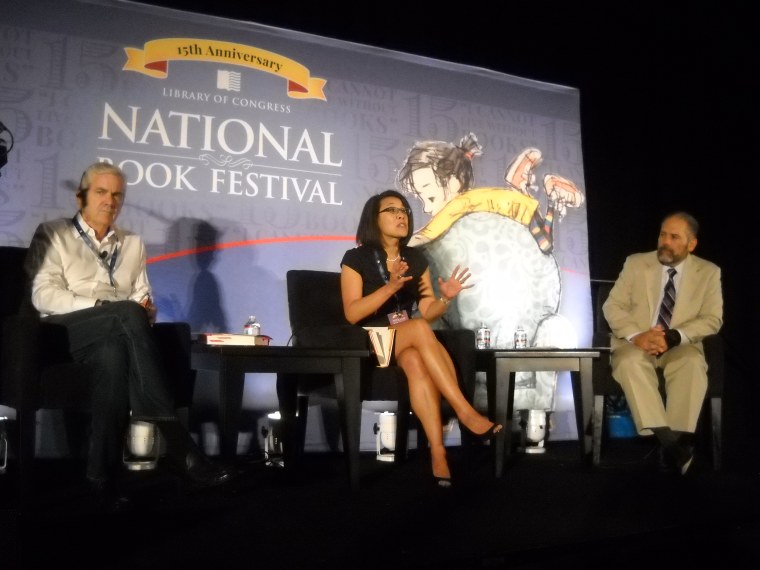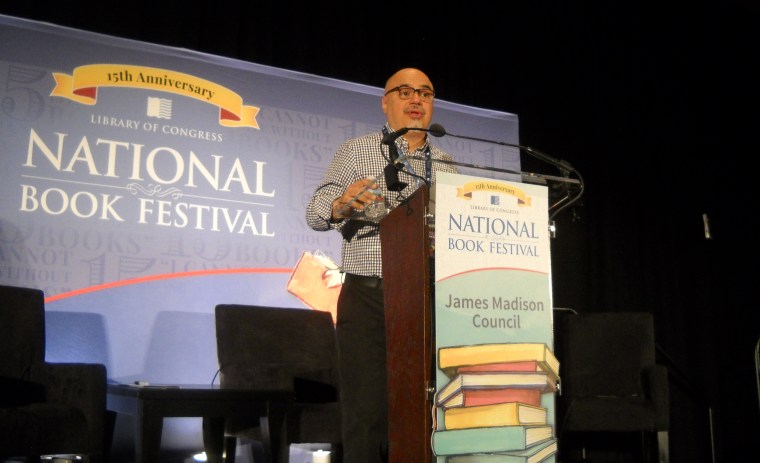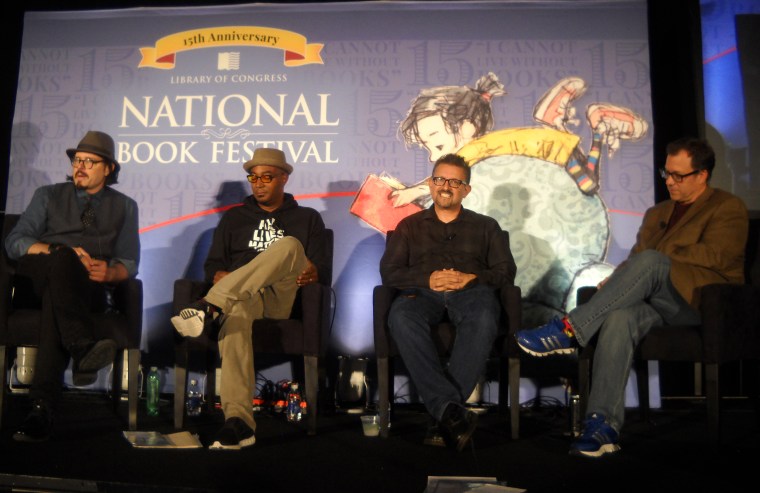WASHINGTON, DC -- It’s an oft-heard assertion particularly of late in the throes of discussions about immigration, especially when talking about undocumented immigrants: Yes, my family came here but they played by the rules and that’s different.
But what were the rules when they arrived?
That’s a key premise of a new book, A Nation of Nations: The Great American Immigration Story, which tells how immigration has changed in the last half century thru the eyes of a handful of immigrant families in suburban Washington, D.C., and written by National Public Radio correspondent Tom Gjelten.
“...The rules were if you were white, you were welcomed. They came from Norway and they didn’t have to request a visa, they just got on a boat and came. They were considered to be a superior culture. The rules were totally rigged in their favor,” Gjelten said.
Historian Erika Lee’s ancestral experience was completely different. “Right now the discussion on immigration is about the U.S. southern border, but back 100 years ago, the immigrant menace was my grandparents. I have grandparents who took on a false identity in order to come to the states.” Lee is director of the Immigration History Research Center at the University of Minnesota and the author of a new book, The Making of Asian America: A History.
“We are at a transformative crossroads between what I see as the old immigrant America and the new immigrant America. It’s important to consider as we see what kind of country we are going to be in the next 50 years,” said Lee.
Gjelten and Lee’s comments were part of a panel discussion moderated by award-winning journalist and author Ray Suárez and held before a packed auditorium at the 15th Annual National Book Festival in Washington, D.C. by the Library of Congress.

“I tend to think of immigrant stories, and our contemporary debate rests on stories we tell each other and sometimes they are quite removed from the actual facts and even from the actual family history of people who are telling these stories,” said Suárez, an anchor for the Al Jazeera news network and author of the several books, including his most recent Latino Americans: The 500 Year Legacy That Shaped a Nation.
Immigration was just one of dozens of topics featured at this year’s gathering, which took up the entirety of the city’s convention center in downtown Washington -- two enormous buildings the size of 35 football fields -- and Latinos figured prominently in the event lineup that organizers say attracted more than 200,000 attendees and over 170 authors.

Former Los Angeles Times reporter and Pulitzer Prize winner Héctor Tobar was there to talk about his critically acclaimed look at the ordeal that nearly three dozen miners in Chile endured in August 2010 after their mine collapsed. “This book is the great journalistic endeavor of my life,” said Tobar of his tome, Deep Down Dark: The Untold Stories of 33 Men Buried in a Chilean Mine and the Miracle That Set Them Free. His agent, Tobar told the audience, happened to be at the meeting in the Chilean capital of Santiago where the miners met with lawyers to talk about getting their story out, and Tobar was the only writer given exclusive access.
“I told them that you guys are going to be living an adventure story that people are going to be talking about for a thousand years. It was the odyssey of our times,” he says, adding that he took a distinct lesson out of writing the book.
“The family routine is what heals the men: the meal on the table, the family routine. That’s the central message I took from the book, that how important family life in in the lives of all of us.”
Tobar’s account has been turned into a movie, 33, set to premiere November 13 and starring actors Antonio Banderas and Juliette Binoche. Currently a journalism professor at the University of Oregon, Tobar says it was a privilege to be featured at the festival.
“This is a great honor since I am from a family that has illiteracy in its past. My grandmother was a Guatemalan Mayan servant who did not know how to read and write, and for her grandson who became a writer to be here, this is truly a great honor.”
‘Family’ was also a central theme in Poet Laureate Juan Felipe Herrera’s presentation. The nation’s first Latino poet laureate and the son of migrant farmworkers, Herrera unveiled his project La Casa de Colores, (the House of Colors) which includes an invitation to contribute a verse that will be part of what Herrera says will be “an epic poem” about life in the United States and titled La Familia (The Family) with a new monthly theme about American life, values or culture.
“If it is a casa, a grand house of all of us, we must be a familia, a family. La Casa de Colores is a house for all voices. In this house, we will feed the hearth and heart of our communities with creativity and imagination, and we will stand together in times of struggle and joy,” Herrera said.
Herrera’s project will launch later this month at the Library of Congress to coincide with Hispanic Heritage Month.

For only the second year in a row since the national book festival started in 2001, cartoonists and authors of graphic novels were granted their own pavilion space at the book festival, and this year several cartoonists of color were featured, including syndicated cartoonist and illustrator Lalo Alcaraz.
“I had requested that they get more cartoonists of color and they said why don’t you do it and here I am. It’s very important to have Latinos at the National Book Festival,” Alcaraz told NBC News. “The public is very diverse and that should be reflected in the lineup of the speakers. An audience that reads is more educated and more open minded, and cartoons are a part of books. My wife is a teacher and I ask her if she minds that the kids are looking at comic books, and she says as long as they’re reading, it’s all good.”
Alcaraz is a consultant on a Pixar movie, "Coco," about the Mexican holiday Day of the Dead that is set to premiere in 2017, and is a writer and illustrator on the upcoming animated series Bordertown, about a racist Border Patrol agent and his very successful Mexican neighbor. “It has a lot of political satire. It’s funny, and all hell is going to break lose when it comes out,” he joked.
Bordertown premieres on the Fox network next January 3rd.
Spanish-language literature was a popular feature at this year’s festival, with authors and writers from a variety of Latin American countries, including Peru, Chile, and Mexico, speaking to crowded rooms.
“It’s very important to have Spanish-language literature at the National Book Festival. It’s a language that is very much alive and well, and its literature every day gains more readers,” said author Cristina Rivera Garza, a professor of Creative Writing at the University of California, San Diego and a native of Mexico. “It’s more difficult to publish in Spanish (in the United States) than in English, but the more we have these types of gatherings, the more we will see more potential for Spanish-language literature in the United States.”
“I agree that this is an excellent idea to have Spanish literature at this book festival,” said attendee María Elena Shamen, a Spanish teacher at the U.S. State Department and a native of Bolivia. “Many of us are away from our native countries and we need to refresh our minds about what’s going on in our native countries, and one way to do that is thru literature and poetry. We are a community here in the United States that indeed speaks English, but we also value our Spanish language.”
Esperanza Román Mendoza, a linguistics professor at George Mason University in suburban Fairfax, Virginia, concurred. “The Spanish language in the United States is no longer a strange language. The culture is no longer a strange one. Highlighting Spanish-language literature is good not only for us but also for those who want to learn more about our culture and our language,” said the native from Spain. “These kinds of events show people that our culture is not just about food and parties.”